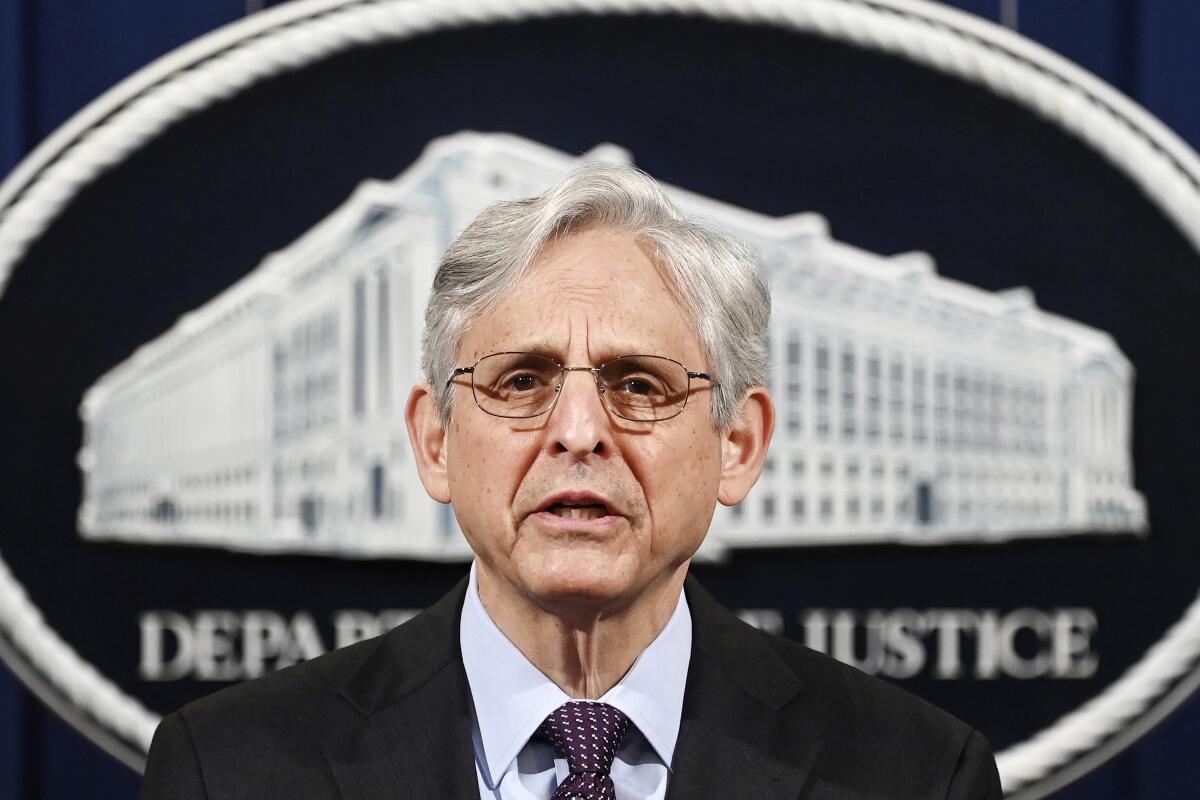Column: Why Biden’s Justice Dept. may disappoint the president and his voters

Many people view Atty. Gen. Merrick Garland as the polar opposite of the Trump-era attorneys general. His tenure, they expect, will be marked by the wholesale reversal of policies and practices put in place by Trump Atty. Gen. William Barr, in particular. Where the previous Justice Department zigged, Garland will zag.
It won’t work that way. Garland, a thoroughgoing institutionalist, is likely to tread cautiously. Much of what the Justice Department does under his leadership is apt to disappoint liberals hoping for a sea change.
In his nearly 75 days in office, Garland has undone some of the most blatantly political acts of his predecessors. He reinstated prior “pattern and practice” policies related to investigating police departments for rogue behavior, and he removed restrictions on federal funding for “sanctuary cities.”
But in the main, Garland, will have his eye on the long-term vitality of the Justice Department, and on the stability of the law, not on sharp reversals. It’s a lowercase “c” conservative mindset. Not incidentally, a primary mission of the Justice Department — putting bad people in jail — is itself conservative.
Here’s how former Solicitor Gen. Seth Waxman, who served with Garland (and me) in the Department of Justice in the 1990s, explains it: “When administrations change, there will be policy differences, but the attorney general, in evaluating how to negotiate those changes, is quite properly mindful of the long-term interest in stability of the law.”
We can see how such stability might play out in three issues that have confronted the Justice Department recently.
We learned last week that the department batted down an effort begun under Trump to use a grand jury subpoena to obtain the identity of a tweeter who annoys Rep. Devin Nunes (R-Tulare). To all appearances, that’s an abuse of grand jury power, and the Justice Department without fanfare withdrew it — an easy institutionalist call for reversal of field.
Second, and more complicated, there’s the Trump-era decision to seek the death penalty for Robert Bowers, the accused perpetrator of the 2018 mass shooting at the Tree of Life Synagogue in Pittsburgh, where 11 peopled were killed. Bowers has yet to be tried, but the main issue will be whether he is sentenced to death or life without parole.
President Biden campaigned in opposition to the death penalty, and we should expect that view to be reflected in his Justice Department’s policy, as Waxman indicates. Trump’s Justice Department pushed federal executions; Biden’s will not. But that doesn’t mean it will reverse itself in Bowers’ case or others already on the books. Such an about-face would be destabilizing; besides, the Tree of Life killings represent about as strong an argument for the death penalty as there could be.
Finally, consider the secret memo former Atty. Gen. Barr claims to have used to justify his controversial conclusion that the Mueller report failed to implicate Trump in obstruction of justice. This month, U.S. District Judge Amy Berman Jackson ordered the memo made public, pursuant to a Freedom of Information Act request. Will Garland’s Justice Department appeal or please Democrats and stand aside?
Jackson disagreed with the Justice Department’s position that the memo was exempt from a FOIA request because it had been part of Barr’s “deliberative process.” In Jackson’s view, Barr had made up his mind ahead of time about the president’s culpability, without benefit of the memo. There was no deliberative process, so the memo deserved no protection.
Seen only through a political lens, Jackson’s decision might seem welcome. It would release an important memo to public view with some added payback for Barr (and Trump) for what most legal observers consider is a mischaracterization of Robert S. Mueller III’s conclusions.
But that’s not the viewpoint Garland and the Justice Department will bring to the question. The department might decide not to appeal, but it would be for very different reasons.
By regulation, the decision lies first with the solicitor general, in this case acting Solicitor Gen. Elizabeth Prelogar. She is bound to collect the views of the constituencies in the department with a stake in the interpretation of the deliberative process exemption. She will be mindful that Jackson’s ruling can have little collateral impact (it is not binding on other courts), but a ruling against the exemption at the appeals level would cast a broad shadow nationwide. She will weigh how likely such a decision would be, and more importantly, how much could it weaken an exemption that the department regularly invokes.
No matter Prelogar’s decision, it is within Garland’s power to overturn it. But that kind of big-footing is itself institutionally destabilizing. It’s something I think Garland would be very reticent to do.
Overall, Garland’s Justice Department is likely to stay the course set by the previous administration in many instances. Even for partisans, that shouldn’t be bad news. Garland and company are right to be resolutely indifferent to pleasing the political instincts of the president and his followers.
Actually, the attorney general’s institutionalism should comfort Biden supporters. It’s proof that Garland zigs where Trump’s attorneys general zagged.
More to Read
A cure for the common opinion
Get thought-provoking perspectives with our weekly newsletter.
You may occasionally receive promotional content from the Los Angeles Times.










